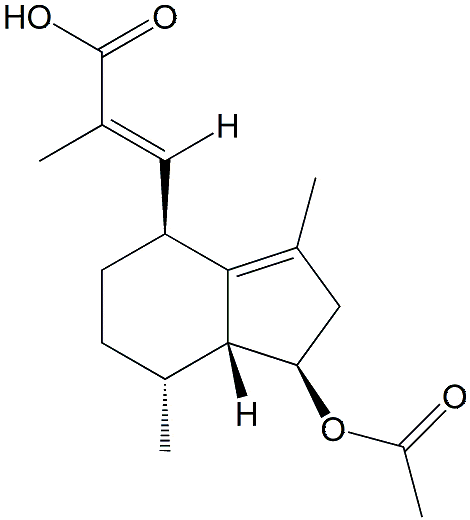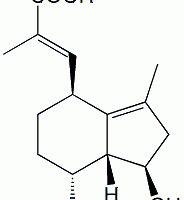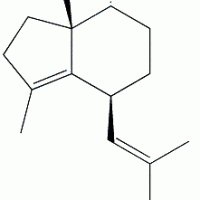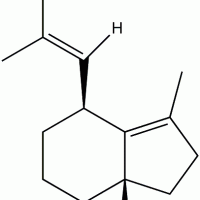- Required Weight missing.
Abstract
Acetoxyvalerenic acid and hydroxyvalerenic acid are derivatives of valerenic acid. Acetoxyvalerenic acid (CAS 84638-55-1) is a monocarboxylic acid and a bicyclic sesquiterpenoid phytochemical naturally occurring in valerian root (Valeriana officinalis). Extracts from valerian root have been used in alternative medicine for over 2,000 years. It was first utilized for treatment of a brain disorder in the late 16th century. Valerian has been and continues to be used as an herbal sedative which may be helpful in the treatment of insomnia. Its history of use dates back to the time of ancient Greece and Rome.
This group of organic acids produce various pharmacological effects, including sedative, antidepressant, neurotoxic, sedative, and anxiolytic. Both of these acids possess roles in brain-derived neurotrophic factor (BDNF) and gastrointestinal (GIT) motility. Valerenic acid may also affect Alzheimer’s disease, through an increase in BDNF expression. Valerenic acids are a subtype-selective GABAA receptor positive allosteric modulator via a binding site in the transmembrane domain at the β+α− interface.
This is part of the recommended set of standards from valerian root. If you are interested in the additional standards, please follow this link.
Compound Details
| CAS | 84638-55-1 |
|---|---|
| Molecular Weight | 292.375 |
| Chemical Formula | C17H24O4 |
| IUPAC | (E)-3-[(1S,4S,7R,7aR)-1-acetyloxy-3,7-dimethyl-2,4,5,6,7,7a-hexahydro-1H-inden-4-yl]-2-methylprop-2-enoic acid |
| Synonyms | N/A |
| SMILES | CC1CCC(C2=C(CC(C12)OC(=O)C)C)C=C(C)C(=O)O |
| Purity | 95% |
| Storage Temperature | Below -18 degrees C |
| Storage Conditions | Dry, freezer |
Product Documents
Product Use Disclaimer
Products are sold as laboratory reference materials, to be used for diagnostic and in vivo testing. The samples are not certified for veterinary or human use.
$13.00 - $16.00 / milligram
| Range (milligram) | Price ($/milligram) |
|---|---|
| 10 - 24 milligram | $16.00 / milligram |
| 25 - 99 milligram | $15.50 / milligram |
| 100 - 249 milligram | $15.00 / milligram |
| 250 - 499 milligram | $14.00 / milligram |
| 500 - 1000 milligram | $13.00 / milligram |
Technical Support
Product information is from published literature. Due to the nature of scientific experimentation, results or specific product application may vary (e.g., selectivity, detector response). If you have questions about the product, its application, and associated analytics, please contact our technical support team.
Related products
-
View Item
Hydroxyvalerenic Acid – CAS 1619-16-5
$10.40 - $15.00 / milligram -
View Item
Valerenic Acid – CAS 3569-10-6
$6.95 - $9.50 / milligram -
View Item
Valerenal – CAS 4176-16-3
PRICE ON REQUEST





